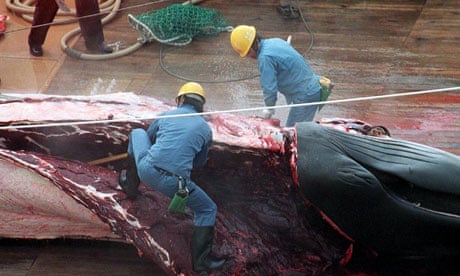An attempt to break the impasse over the global ban on whaling by allowing the first legal commercial hunting of whales in nearly 25 years came under attack from conservationists today.
The International Whaling Commission (IWC) has proposed a 10-year "peace plan", which it said would maintain the global moratorium on commercial whaling but allow limited catches for those countries that continue to hunt whales despite the ban.
The plan aims to broker a compromise in the dispute between countries such as Britain which are opposed to whaling and those that hunt the mammals.
Currently Iceland and Norway whale commercially, setting their own quotas, while Japan exploits a loophole allowing it to catch whales under an exemption for "scientific" whaling.
Under the proposals set out by the IWC those countries would have to agree to catch limits set by the commission and based on scientific advice.
The IWC said the plan, which will be discussed at the annual meeting of the commission's 88 country members in June, would mean several thousand fewer whales would be caught than if the current situation continued.
Cristian Maquieira, chairman of the IWC, said: "For the first time since the adoption of the commercial whaling moratorium, we will have strict, enforceable limits on all whaling operations. As a result, several thousand less whales will be killed over the period of the agreement. In addition, no other IWC countries will be permitted to start hunting whales during the period."
The IWC urged countries to put their differences aside to focus on ensuring the world had "healthy" whale stocks.
It also said the plan would mean a whale sanctuary was created in the South Atlantic. But the wildlife charity WWF said the plans allowed for the hunting of endangered fin whales and sei whales whose numbers have been severely depleted by commercial whaling.
It would also endorse whaling in the Southern Ocean whale sanctuary, which is an important feeding ground for species including blue whales, humpback whales and fin whales, WWF said.
Heather Sohl, species policy officer for WWF-UK, said: "If there is one place on Earth where whales should have full protection, it is the Southern Ocean.
"Some whales feed exclusively in the Southern Ocean – not eating at all during the winter months when they travel up to tropical waters.
"Allowing commercial whaling in an area where whales are so vulnerable goes against all logic."
She added: "Both fin and sei whale species were depleted to severely low levels by previous whaling that spun out of control, and they remain endangered as a result.
"Allowing new commercial whaling on these species when they have yet to recover from previous whaling is management madness."
The Pew Environment Group also criticised "unacceptable provisions" in the plans.
Susan Lieberman, director of international policy for the environmental organisation, said: "The draft compromise would allow whaling by Japan in the waters surrounding Antarctica to continue.
"The safe haven of the IWC-declared Southern Ocean Whale Sanctuary – and the IWC's moratorium on commercial whaling – should be set in stone, not set aside.
"The proposal would phase down but not eliminate the number of whales killed by the annual expedition of Japan's industrial whaling fleet into the environmentally sensitive Southern Ocean and includes a quota for endangered fin whales, which is objectionable.
"This high seas sanctuary for whales, including endangered fin and humpback whales, must be respected."
The International Fund for Animal Welfare (Ifaw) described the IWC plans as a "whalers' wish list".
Patrick Ramage, Ifaw's whale programme director, said: "It throws a lifeline to a dying industry when endangered whale populations face more threats than ever before.
"This would be a breathtaking reversal of decades of conservation progress at the IWC."
The animal welfare organisation said countries such as Germany and the US were involved in negotiations to draw up the deal.
And Robbie Marsland, UK director of the animal welfare organisation, said: "Whaling is unequivocally banned in EU waters.
"It would be hypocritical in the extreme not to condemn a deal which sanctions whaling elsewhere.
"Instead of twisting arms to get a deal that conserves whaling, the EU should be promoting 21st-century conservation measures and working to end commercial whaling once and for all."
